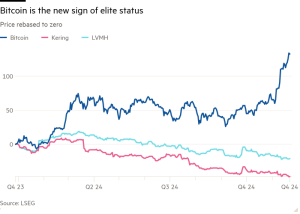UK companies given greater leeway to award executives big pay rises
Unlock the Editor’s Digest for free
Roula Khalaf, Editor of the FT, selects her favourite stories in this weekly newsletter.
London-listed companies will have greater flexibility to pay top executives higher salaries under new guidance from the UK’s £9.1tn investor body, despite a series of shareholder protests against bumper pay packets.
The Investment Association, the trade body representing 250 large investors holding important stakes in UK-listed companies, said on Wednesday that it had “simplified” its remuneration guidelines so that companies could set pay policies to “suit their specific needs” while also “being responsive to shareholder expectations”.
The move comes after prominent business figures called for higher executive pay to encourage companies to stay listed on the London Stock Exchange following an exodus of groups moving to the US, where executive remuneration tends to be higher.
Andrew Ninian, a director at the IA, said the revised guidelines “demonstrate that investors want to incentivise delivery of long-term performance”.
The investment body said its members wanted “a competitive” listing environment “that attracts companies to list and operate in the UK” and noted that “during the past year, there has been significant debate” on executive remuneration and “its impact on UK-listed companies”.
Companies’ remuneration committees use the IA guidelines when deciding whether to increase executive pay. Companies can deviate from the guidelines but shareholders generally expect the reasons to be explained.
Julia Hoggett, chief executive of the London Stock Exchange, said last year that UK executives should be paid more if the country wanted to retain talent and prevent companies moving overseas.
The IA had committed last year to reviewing its guidance after pressure to respond to concerns that it was too rigid and made it difficult for companies with an international presence to attract top executives, particularly from the US.
Keith Barr, the former boss of InterContinental Hotels Group, is among a handful of executives to have left the UK in favour of the US. He warned that the UK was “not a very attractive place” for listed companies.
But the move to reward executives with higher pay risks stoking a greater backlash from some shareholders, after significant investor revolts against pay increases this year. AstraZeneca’s investors approved a potential £1.8mn increase for boss Pascal Soriot in April but the company was hit by a significant revolt from shareholders.
London Stock Exchange Group and Smith & Nephew were among the other FTSE 100 companies that pushed through higher executive pay deals at their AGMs this year.
The updated guidelines allow for companies to benchmark executive pay against international rivals, noting that if a significant proportion of revenues are generated in an overseas market, such as the US, the remuneration committee “is encouraged to set out the impact of attracting global talent on the positioning of remuneration”.
Luke Hildyard, director of the High Pay Centre, a think-tank, said that executive pay practices at global peers were “relevant in some instances” but noted that “few UK companies are of a similar size or global footprint as the biggest US firms, so comparisons are mostly redundant”.
Remuneration consultants at Alvarez & Marsal said the change was “positive” and “may help the market to develop a more rational and less emotionally charged framework for discussing pay levels”.
The new guidance also makes it easier for companies to adopt “hybrid” pay structures, which include long-term incentives that reward loyalty but have until now been more common in the US than the UK. Companies will also be given more flexibility on the level of director bonuses that must be deferred.
The IA said boards should exercise discretion to “avoid rewarding or penalising executives for factors beyond their control or influence”. Alvarez & Marsal said this more flexible approach was “a significant change in tone from the IA”.
#companies #greater #leeway #award #executives #big #pay #rises






